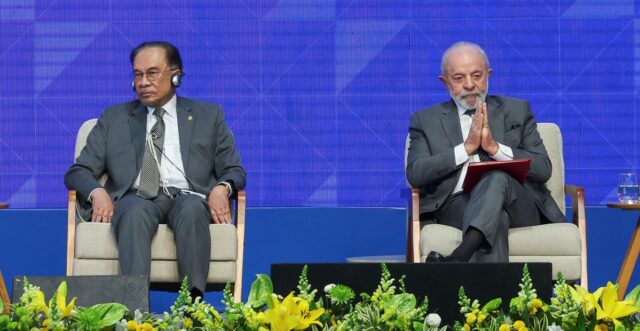
The 17th BRICS Summit begins tomorrow in Rio de Janeiro, Brazil, with key discussions expected on global governance, climate finance, artificial intelligence and South-South cooperation.
Prime Minister Narendra Modi will take part in the summit, which brings together 10 full members, 12 partner countries, 8 invited nations and 7 heads of global and regional organisations.
This year’s theme is “Strengthening Global South Cooperation for Inclusive and Sustainable Governance.”
BRICS: What’s On The Table?
According to Dammu Ravi, Secretary (Economic Relations) Ministry of External Affairs, the main discussions tomorrow with full members will be on reforms in global governance. This will be followed by a working lunch session on peace and security. In the afternoon, leaders will discuss multilateralism, economic and financial issues and artificial intelligence. The day will close with an official reception.
The next day’s agenda includes climate change, COP30 preparations and global health. Brazil is set to host COP30 later this year. Four major outcome documents are expected from the summit:
- Leaders’ declaration
- Statement on global governance and AI
- Framework on climate finance
- BRICS partnership for eliminating socially determined diseases
Additional reports from the National Security Advisors, Business Council, Women’s Business Alliance and Civil Society are also being submitted to the leaders.
Terrorism, Pahalgam And India’s Position
Responding to media queries ahead of the visit, Ravi confirmed that BRICS nations supported India after the Pahalgam terror attack. “There is no contradiction in how members expressed sympathy and solidarity with India,” he said, adding that there’s shared understanding that terrorism must be tackled without exception.
BRICS Push For Local Currencies
Addressing the economic angle, Ravi clarified that BRICS is not creating a common currency. Instead, members are looking to settle trade in national currencies to reduce dependence on the US dollar and Euro.
“This is not about de-dollarisation,” he explained. “Countries are exploring alternatives for trade and project financing in national currencies. This is a process that involves central banks and businesses.”
Joint Declaration Likely
Prof. Rajan Kumar, School of International Studies, Jawaharlal Nehru University, believes that BRICS is unlikely to face the kind of deadlock seen at the Shanghai Cooperation Organisation (SCO) summit.
“The SCO has Pakistan as a member, and that makes passing resolutions on terrorism very difficult. China shields Pakistan at international platforms,” he said. “BRICS, on the other hand, is a global organisation with a different goal. It competes with the G7 in some ways and is seen as a credible platform for the non-Western world.”
Prof. Kumar expects a joint declaration at the Rio Summit. “The focus on artificial intelligence ethics, climate action and global peace has likely led to a consensus,” he told StratNews Global.
He also noted India’s increasing support for BRICS, especially in a turbulent world order. “India sees BRICS as an alternative forum, particularly after Donald Trump’s unpredictable trade and tariff policies.”
With Chinese President Xi Jinping and Russian President Vladimir Putin not attending in person, Prime Minister Modi is expected to take centre stage alongside host nation Brazil.
Iran’s First International Appearance Since Bombings
This is also an important summit for Iran, which joined BRICS recently. It marks Iran’s first major global engagement since recent Israeli and U.S. attacks.
“BRICS nations have condemned Israeli strikes on Iran’s peaceful nuclear programme and called for peaceful resolution. This is a big win for Iran, as few countries openly support it against the U.S,” Prof. Kumar explained.
India had earlier distanced itself from condemning Israel at the SCO Summit, but did not object when BRICS included such a statement. “This is a shift in New Delhi’s position, probably to show alignment with the Global South,” he noted. “In return, BRICS countries may support India’s position on terrorism.”
Can BRICS Stand Trump’s Pressure?
While some suggest U.S. pressure under the Donald Trump presidency may affect BRICS, Kumar disagrees. “Countries are cautious due to ongoing trade talks with the Trump administration. But they are not leaving BRICS,” he said. “They see BRICS as an alternative platform, especially when global bodies like WTO, WHO and the G7 are failing.”
He stated that Trump is a temporary factor, but BRICS is built for the long term. “Members will balance carefully between American pressure and BRICS’ anti-West stance.”
BRICS, South-South Cooperation And Africa
With growing intra-BRICS trade and investment, the group is becoming a major voice for the Global South. Africa, in particular, is expected to benefit from BRICS’ focus on trade, digital governance, healthcare and climate projects.
The New Development Bank (NDB) continues to play a key role in financing development in Global South countries.
“Every continent now has representation in BRICS,” Kumar noted. “That makes it a truly representative platform for the developing world.”




